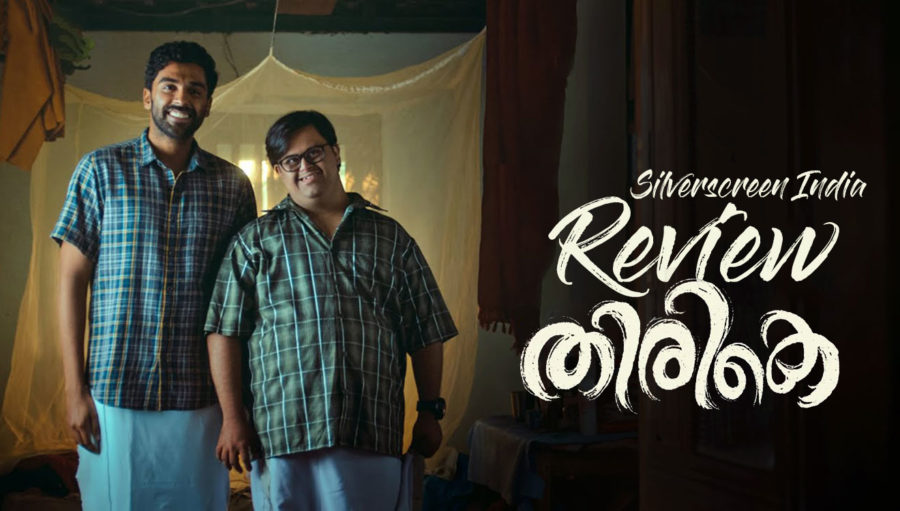Director: Sam Xavier and George Kora
Cast: Gopi Krishnan, George Kora, Shanthi Krishna, Gopan Mangat, Sarassa Balussery
At the beginning of Thirike, two little boys whose parents died recently wait on the corridor of a Christian orphanage. The younger one, Thoma, is fiercely protective of Sebu, the elder child. The film seems to be protective of him too. Throughout the sequence, he is carefully hidden from the camera eye. In the end, the film reveals what it had been holding like a secret ﹣ Sebu is a child with Down Syndrome.
This well-staged, well-performed sequence launches the viewers into the world of the siblings. When the film cuts to several years down the line, we see that Sebu (Gopi Krishnan), whom everyone assumed to be the defective one, has grown into a confident young man who laughs and makes others laugh effortlessly, thanks to the support of a new family. Thoma (George Kora), the boy who had wanted to be a guardian, has turned into a loner struggling to find happiness, who cannot free himself of the emotional burdens from the past. He keeps hovering around his brother, trying to guard him against forgetting the past. The irony is tragic.
Thirike, directed by Sam Xavier and George Kora, is founded on this impressive idea. Through the tale of the two siblings, who are misfits in their surroundings in two different ways, the film examines how love and kindness make the world a better place.
While there is a lot to love about Thirike, it is impossible to ignore its appalling weaknesses. For the most part, the film flits between silly and solemn, unable to choose between the two. It suffers from a compulsive urge to keep everything feel-good and fun, even at the cost of subtlety.
The tonal inconsistency is apparent in the former half of the film, where the narrative is built on broad strokes. For instance, at Sebu’s birthday party, one of his friends, a mean little boy, announces to his friends that Sebu is ‘different’ and ‘sick’. He is a shorthand representation of the rest of the world who don’t see Sebu as an adorable young man as his family does. But should the depiction of the real-world be as flat and artless as this?
The faux-cheerful approach ruins the film’s intention to delve into the complexity of the relationship that Thoma shares with Sebu. Sometimes it sets up a cue to laugh at the most inappropriate places. When Sebu goes missing, Thoma does a loud and ridiculous ‘act’ at the distraught foster family’s apartment to register his exasperation.
Sebu’s foster family (Shanthi Krishna and Gopan Mangat), affluent and immensely kind, has rechristened him as Ismail. There is a contest between them and Thoma to win the young man’s love. But the viewers do not get a great view of the younger sibling. How did the quiet boy transform into a compulsive liar who makes up for everything he lacks in life by posing as a charmer? How did he survive post parting from his brother? Kora’s performance is sincere but inadequate in expressing the gravitas Thoma has tucked away deep within himself.
In the latter half, set in the brothers’ native village in Idukki, the filmmaking style undergoes a definite transformation. It attains an emotional sensitivity and an eye for details ﹣qualities which were thoroughly absent in its former part. The class differences between Thoma and Sebu gets narrower as they trace their once-abandoned home diligently manned by Shosamma (Sarassa Balussery), a friendly granny next-door. The camera (cinematography by Cherin Paul) turns more conscious too. In one of the film’s mightiest scenes, the camera stays still inside the kitchen of a lonely Shosamma as she tries to gather herself together.
Gopikrishnan’s persuasive performance is Thirike‘s greatest asset. The debut actor walks a fine line between jolly and vulnerable without going overboard. There is an instance where a girl he likes politely breaks his heart. He laughs that awkward laugh, hiding his disappointment.
Recommended
Kora and Sam treat Sebu delicately. You understand why his mother and Thoma have to scramble for his affection. Sebu does not understand the theatrical expressions of love. For him, love implies looking for umma (mother) at night. Love is why he leaps towards Thoma when a car alarm goes off out of the blue. Kora and Sam recognise these gentle signs and create a heartwarming finale.
If the film appears better than the sum of its parts, it is because of this understated climax where it states: a genetic disorder is not a tragedy, but the absence of love is.
****
The Thirike review is a Silverscreen original article. It was not paid for or commissioned by anyone associated with the film. Silverscreenindia.com and its writers do not have any commercial relationship with movies that are reviewed on the site.



